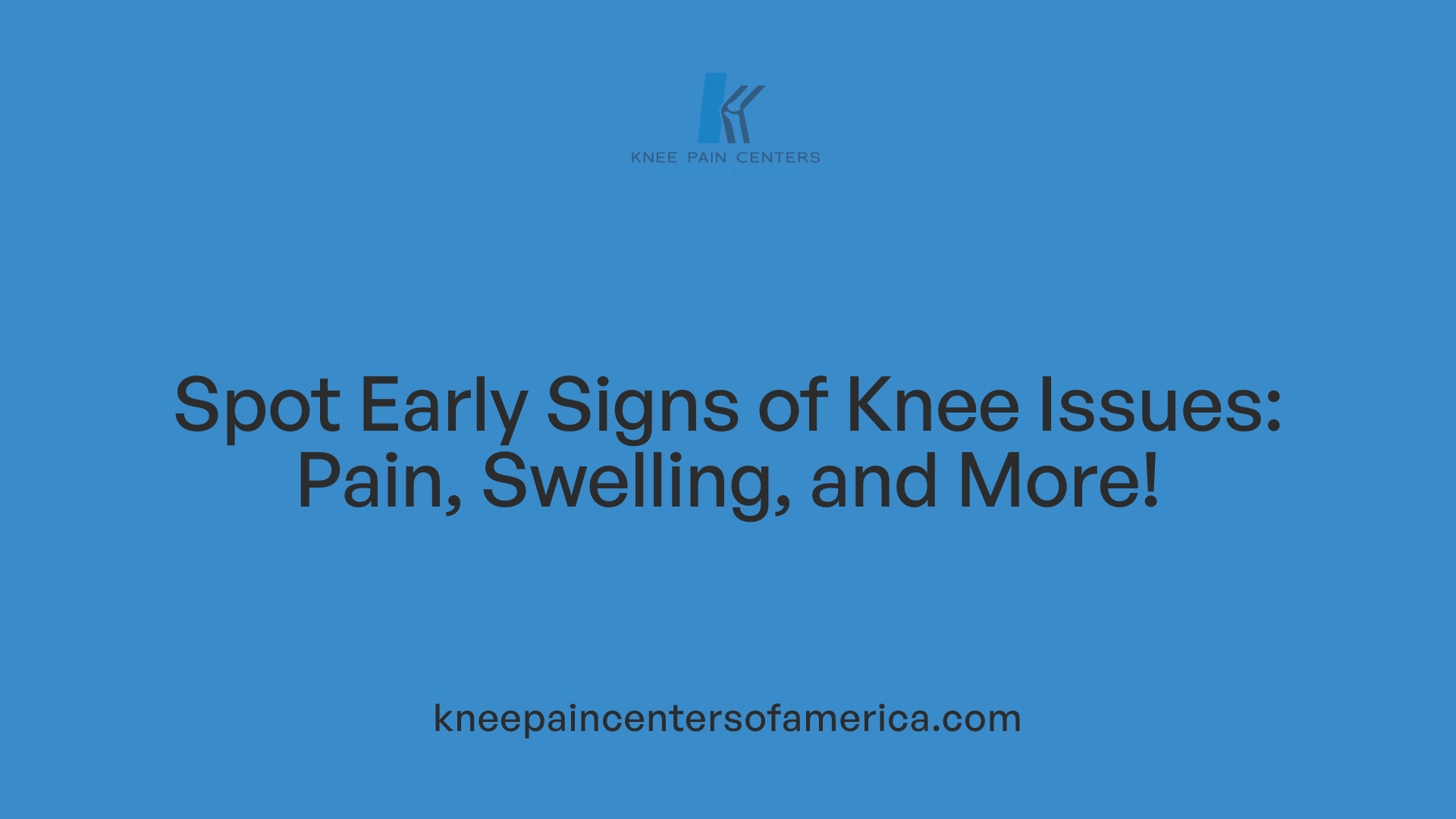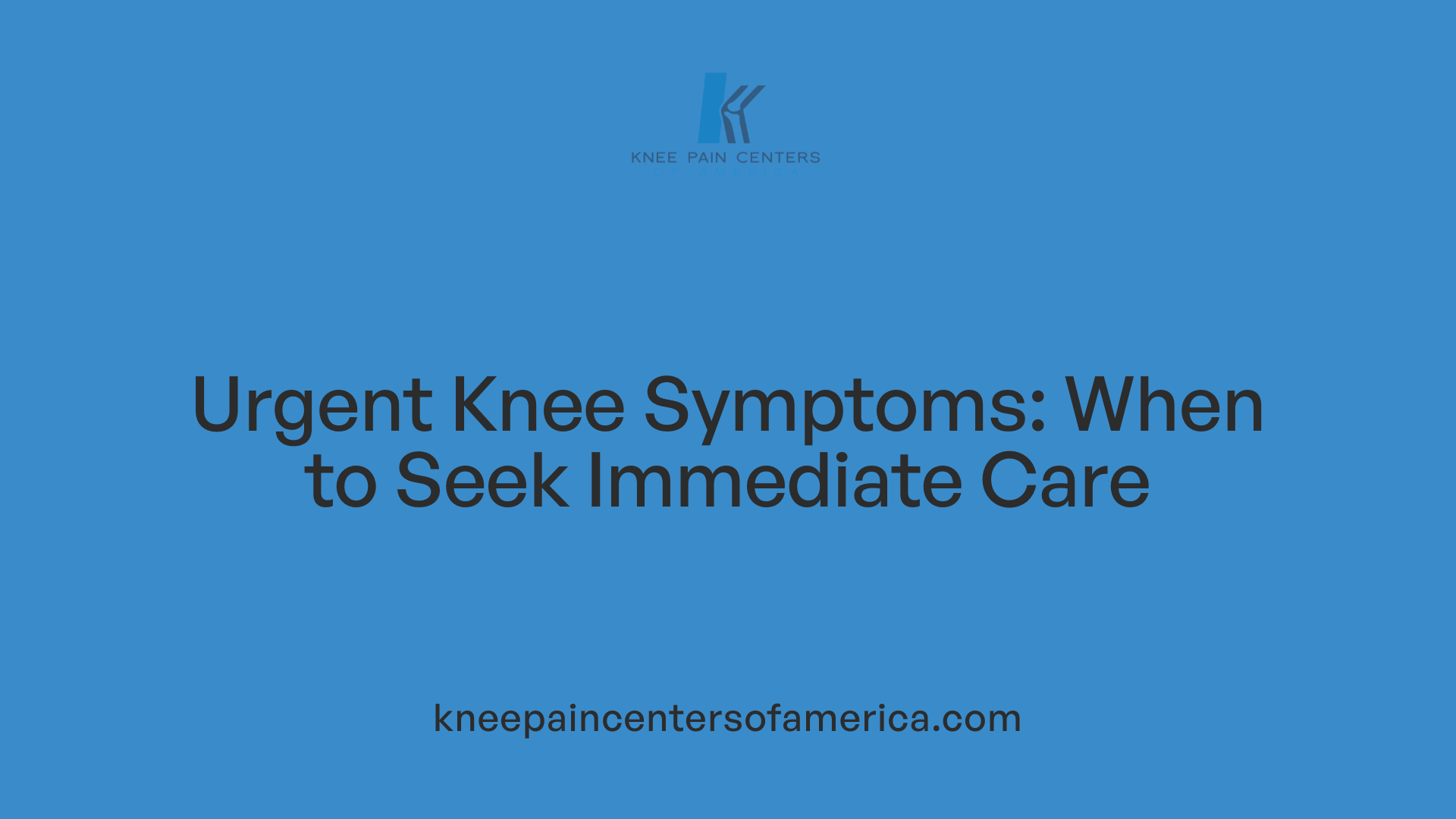Understanding the First Signs of Knee Problems
Knee joint problems are common and can affect individuals across all age groups. Recognizing early symptoms is crucial for prompt management and preventing serious damage. This article explores how to identify the initial signs of knee issues, differentiate normal discomfort from warnings, and when to seek professional medical advice.
Recognizing the Initial Symptoms of Knee Problems

What are the early signs and symptoms of knee joint problems?
Knee problems often begin subtly, making early detection important for preventing further damage. One of the most common initial signs is pain during movement or bending, which can be felt when walking, climbing stairs, or squatting. This discomfort is often accompanied by swelling and stiffness around the joint, which may limit mobility.
Patients may also notice a reduced range of motion, such as difficulty fully straightening or bending the knee. The joint might become tender, with redness and warmth visible or palpable, indicating inflammation.
Popping, grinding, or clicking noises—collectively known as crepitus—are common sounds during knee movement, resulting from worn cartilage or other joint changes.
Other warning signs include difficulty walking, inability to bear weight, or a sensation of instability or wobbliness, which can suggest ligament or structural issues within the knee.
Persistent symptoms lasting more than a few days, especially if they worsen or are associated with deformity or severe pain, should prompt a consultation with a healthcare provider. Early recognition of these symptoms allows for timely treatment, reducing the risk of long-term damage and improving recovery prospects.
Understanding and observing these initial signs can help individuals seek appropriate medical care sooner, ensuring better management of knee health.
Warning Signs That Signal Urgent Medical Attention

How can I identify warning signs of knee issues before they become serious?
Recognizing serious knee problems early can make a big difference in treatment outcomes. Persistent pain lasting more than a few days, especially when it interferes with your daily activities like walking or working, is a major red flag.
Swelling, redness, warmth, and stiffness around the knee joint may seem minor initially but can indicate underlying inflammation or infection. If these symptoms last more than 24 to 48 hours or are accompanied by difficulty in fully straightening or bending your knee, it's time to seek medical advice.
Watch out for signs indicating instability, such as wobbling, buckling, or feeling like the knee might give out. Sudden deformity of the joint following injury, inability to bear weight or walk, and severe pain are urgent concerns.
Other alarming signs include rapid worsening of symptoms, fever with redness or warmth around the joint—suggesting possible infection—and signs of locking or inability to straighten or bend the knee.
In cases of injury, if pain is immediate and severe, or if movement is impossible, emergency medical care is necessary.
Overall, any persistent or worsening symptoms, especially those impairing your mobility or associated with swelling, redness, or deformity, should prompt a prompt visit to a healthcare professional. Early intervention can prevent more serious damage and improve recovery chances.
Search query for more info: urgent signs of knee problems
Being attentive to these signs and acting swiftly can help you address knee issues before they lead to long-term complications.
Understanding Osteoarthritis and Its Early Indicators

What symptoms are associated with the early stages of osteoarthritis in the knee?
In the initial phases of knee osteoarthritis, individuals often notice subtle symptoms that gradually progress over time. One of the most common early signs is joint pain that worsens with activity or prolonged pressure on the knee, such as standing or walking long distances.
Many people experience stiffness, especially after waking up in the morning or after periods of inactivity. This stiffness can last around 30 minutes or more, making movement initially difficult. Swelling, warmth, and tenderness around the joint are also typical, indicating mild inflammation.
As osteoarthritis develops, movement may produce cracking, grinding, or popping sounds within the joint, caused by cartilage wear and bone spurs.
Patients often feel a wobbliness or instability in the knee, like it might give out or wobble under weight. Locking or sticking within the joint can also occur, which is when the knee temporarily becomes stuck in a certain position.
Over time, these symptoms may lead to decreased joint mobility, making activities like bending, squatting, or walking more challenging. Recognizing these early signs helps in seeking timely medical help to manage and slow the progression of osteoarthritis.
When and Why to Seek Medical Advice
 You should seek medical advice for knee symptoms if you experience severe or persistent pain, swelling, or an inability to bear weight on the joint. These signs often indicate that a more serious condition requires professional evaluation.
You should seek medical advice for knee symptoms if you experience severe or persistent pain, swelling, or an inability to bear weight on the joint. These signs often indicate that a more serious condition requires professional evaluation.
In cases of deformity, such as a visibly misshapen knee or leg, visiting a doctor is crucial. Such deformities can suggest fractures, dislocated kneecaps, or serious tissue injury. Additionally, if you hear a popping or cracking sound immediately after an injury combined with severe pain or swelling, prompt medical attention is necessary to prevent further damage.
Signs following injury or trauma that warrant medical assessment include significant swelling, redness, warmth, tenderness, or fever around the knee. These could point to infection or internal injury and need urgent care.
Symptoms that interfere with daily life—like difficulty walking, limping, or avoiding walking altogether—should also be evaluated by a healthcare professional. Persistent pain that continues beyond a few days or worsens over time needs proper diagnosis and management.
If your symptoms are not improving after a few weeks or are accompanied by worsening stiffness, limited range of motion, or swelling, it is important to consult a doctor. These symptoms may indicate ongoing joint damage, arthritis progression, or other conditions that benefit from medical intervention.
In summary, early medical attention can prevent minor issues from becoming severe and help preserve joint function. Don't ignore signs like sudden severe pain, deformity, or persistent swelling—seek professional care to ensure proper treatment.
Early Detection Ensures Better Knee Health
Timely recognition of the early symptoms of knee joint problems is vital for effective treatment and preventing long-term disability. Being aware of signs like persistent pain, swelling, stiffness, and instability allows individuals to seek medical advice promptly. Regular self-monitoring, understanding risk factors, and seeking professional evaluation at the earliest indications can significantly improve outcomes and maintain healthy knee function for years to come.
References
- Knee pain - Symptoms and causes
- Is Your Knee Pain Serious? 10 Signs You Shouldn't Ignore
- 6 Key Warning Signs for Knee Osteoarthritis
- Arthritis in Knee: Signs, Symptoms, Causes & Treatment
- Five Early Signs of a Knee Problem
- Early Symptoms of Knee Arthritis
- 5 Signs That You Need to Seek Help With Knee Pain
- Knee pain Information | Mount Sinai - New York
- Five Common Knee Injury Symptoms
- Early Warning Signs of Joint Problems





